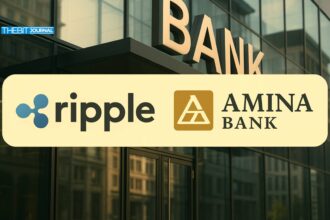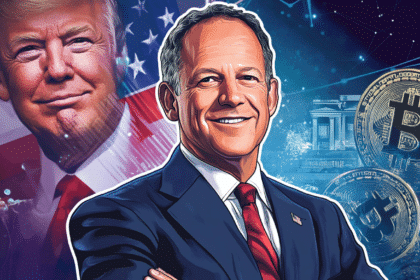Acting Chairman Travis Hill outlined the U.S. Federal Deposit Insurance Corporation’s (FDIC) evolving approach toward digital assets and blockchain technology in his address at the American Bankers Association’s Washington Summit on April 8, signaling a notable shift toward regulatory openness.
In remarks, Hill disclosed that the FDIC already has revised some key policies to decrease the barriers to banks exploring in crypto-related activities. That was until the agency recently reversed course and rescinded the rule that had for years discouraged banks from engaging in crypto operations, mandating them to first get approval from the agency before doing so.
FDIC Removes Approval Requirement for Crypto Activities

Hill also said that FDIC-supervised institutions can conduct permissible crypto-associated activities without prior approval from the Federal Deposit Insurance Corporation and that such activities will be treated the same as other traditional banking activities. Hill stated:
“Permissible crypto-related activities will generally be treated just like other permissible activities.”
Hill acknowledged that banks are still responsible for the risks posed by digital assets, but stressed that innovation should be promoted under benchmarked, consistent oversight.
He added that the agency should consider whether to present explicit definitions of crypto-related activities banks are permitted to undertake, citing previous rulings by the Office of the Comptroller of the Currency (OCC) on custody services, stablecoin reserves, and validator node operations, respectively.
FDIC Plans New Approach to Public Chain Regulations
What types of crypto related activities should regulators, if any, take the initiative in reaching out to clarify its permissibility? He posed a broader regulatory debate to the audience. According to Gulati, further, public blockchains need to have standards created around these, as the other countries allow the banks to operate on the public, permissionless chain, whereas US regulators are more prohibitive.
Of course a complete prohibition on interacting with public chains is clearly too restrictive, what would be prudent guardrails for interacting with public chains? Hill challenged, noting that the Federal Deposit Insurance Corporation plans to revisit 2023 interagency guidance to take a new approach and get to enduring standards that the banks can indiscriminately deal to public chains responsibly.
FDIC Reaffirms Commitment to Innovation and Stability

At the summit, there was a discussion about the currently pending Congress legislation surrounding stablecoin. As more banks consider tokenizing deposits, Hill called for them to gain greater understanding of how stablecoins are affected by liquidity risk, cybersecurity and compliance measures. He floated the idea of reassessing pass-through deposit insurance regulations to determine if stablecoin reserves are defined as such.
As far as the Federal Deposit Insurance Corporation is concerned, we should give certainty: Deposits are deposits whatever the technology, whatever the recordkeeping, Hill said. And he warned that failure of a bank left without safeguards in blockchain-based smart contracts would render the process of resolving failed banks exorbitant.
Without addressing the issue , Hill later closed his address by reiterating the FDIC’s commitment to putting into place a regulatory structure that supports innovation in the digital asset space in a responsible way while ensuring the necessary pillars for safety and soundness remain intact within the banking system.
Conclusion
Hill represents a clear change in the Federal Deposit Insurance Corporation policy by allowing digital asset potential yet ensuring proper management controls remain in place. The agency works to create easier access to crypto banking for financial institutions while maintains necessary safety standards for the industry.
Follow us on Twitter and LinkedIn, and join our Telegram channel to be instantly informed about breaking news!
FAQs
Do banks need FDIC approval for crypto activities?
No, banks can engage in permissible crypto activities without prior FDIC approval.
Can banks use public blockchains?
Yes, but the Federal Deposit Insurance Corporation is working on clear guardrails for responsible use.
How is the FDIC treating stablecoin deposits?
Stablecoin reserves are treated as regular deposits, regardless of the technology.
Glossary Of Key Terms
FDIC (Federal Deposit Insurance Corporation):
U.S. agency that insures bank deposits and oversees financial institution safety.
Permissible Crypto Activities:
Crypto-related services banks are allowed to offer under the Federal Deposit Insurance Corporation rules.
Public Blockchain:
An open, permissionless blockchain anyone can join or interact with.
Stablecoin Reserves:
Assets backing stablecoins are often held by banks to maintain value stability.
Validator Node Operations:
Banks participate in blockchain networks by verifying transactions.
Bank Resolution:
The process of handling a failing bank to protect depositors and the financial system.





























